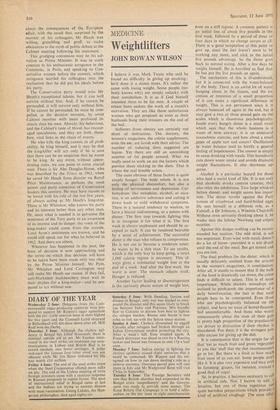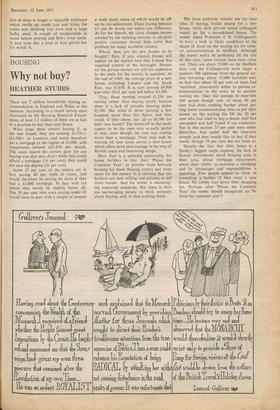MEDICINE
Weightlifters
JOHN ROWAN WILSON
I believe it was Mark Twain who said he found no difficulty in giving up smoking: he'd done it a dozen times. It's rather the
same with losing weight. Some people (no- body knows why) are simply unlucky with
their metabolism. It is as if God himself intended them to be fat men. A couple of cream buns undoes the work of a month's
starvation. They are like those unfortunate women who get pregnant as soon as their husbands hang their trousers on the end of the bed.
Sufferers from obesity are certainly not short of instruction. The doctors, the
women's magazines, the colour supplements, even the nac, are lavish with their advice. The number of reducing diets suggested are legion. Yet there are still an astonishing number of fat people around. What we really need to work on are the factors which prevent them sticking to the diets. That is where the real trouble arises.
The most obvious of these factors is quite simply hunger. The body rebels. It is not only the physical discomfort, but also a feeling of nervousness and depression, Car- bohydrate, like morphine, alcohol, or nico- tine, is an addictive substance and cutting it down leads to mild withdrawal symptoms. There is a natural tendency to weaken, to have a biscuit mid-morning, or a potato with dinner. The first step towards fighting this is to recognise it for what it is. The first week is always unpleasant and should be ac- cepted as such. It can be rendered bearable by a sense of achievement. The successful dieter is the man who refuses to compromise. He is not out to become a moderate eater; he wants to be a thin man. To see results, which is the only way to keep going, a strict 1,000 calorie regime is necessary. This al- ways gives a substantial weight loss at the end of a week, And after the first week, the worst is over. The stomach adjusts itself. Hunger is reduced.
Another factor leading to discouragement is the curiously phasic nature of weight loss, even on a stiff regime. A common pattern is an initial loss of about five pounds in the first week, followed by a period of three or four days in which no change occurs at all. There is a great temptation at this point to give up, since the diet doesn't seem to be working any more, and stick to the initial five pounds advantage. So the dieter goes back to normal eating. After a few days he weighs himself. He is horrified to find that he has put the five pounds on again.
The mechanism of this is ill-understood, but it is connected with the water-balance of the body. There is an awful lot of water hanging about in the tissues, and the ex- cretion or retention of a small proportion of it can make a significant difference in weight. This is not permanent since it is always balanced of again in the end, but it may give a two or three pound gain on the scales which is disastrous psychologically. Inside every hungry dieter is a small voice which says that the whole business is a waste of time anyway; it is an unnatural masochistic exercise, and how about a small .piece of apple tart and cream? Oscillations in water balance tend to fortify a general feeling of hopelessness. The answer is simply to cease drinking with meals. This harmlessly cuts down water intake and avoids dramatic weight fluctuations. It also decreases ap- petite.
Alcohol is a particular hazard for those who lead a social kind of life. It is not only that alcoholic drinks contain calories; they also relax the inhibitions. Two large whiskies before dinner, and weight seems less impor- tant. The dieter revolts against the Puri- tanism of crispbread and hard-boiled eggs. He sees himself in a different role, as a Falstaff, a Dr Johnson, a Winston Churchill. Without even seriously thinking about it, he wades into the lobster Newburg and crepes suzettes.
Against this danger nothing can be recom- mended but caution. The odd drink is not too important. Even wine with meals doesn't do a lot of harm—provided it is not drunk until the end of the meal. But get stoned and you are lost.
The final problem for the dieter, which is usually delicately omitted from the articles in the women's magazines, is constipation. After all, it stands-to reason that if the bulk of the food is drastically cut down, the colon finds it difficult to adjust. This is of sonic importance. While doctors nowadays arc inclined to pooh-pooh the importance of a daily bowel-motion, the fact is that most people hate to be constipated. Even those who are psychologically balanced on the subject, and have no trace of bowel-fixation. feel uncomfortable. And those who worry' unnecessarily about the state of their guts (a pretty high proportion of the population) are driven to distraction if their rhythm is disordered. For them it is the strongest puS' sible excuse for giving up the diet. It is constipation that is the origin for all that 'eat as much fruit and green vegetables as you like' stuff that the diet recommender; go in for. But there is a limit to how much fruit most of us can eat. Some people don't like it. It is also very expensive and may even be fattening; grapes, for instance, contain 3 good deal of sugar. So, in practice, it becomes necessary to call in artificial aids. Not, I hasten to add. 3 laxative, but one of those ingenious and quite harmless preparations which provide kind of artificial roughage. The most 0'0"
tive of these is Isogel, a vegetable substance which swells up inside you and tricks the colon into thinking you have had a large bulky meal. A couple of teaspoonfuls in water before retiring and Bob's your uncle. It may taste like a load of bird gravel but it's worth it.



































 Previous page
Previous page